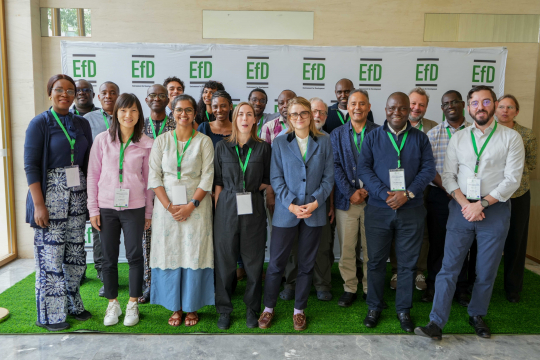Carbon markets are increasingly being recognized as an important instrument to reduce global emissions. EfD is conducting a comprehensive study on Exploring the potential and challenges of setting up a Voluntary Carbon Market in the Global South, with a focus on Africa. The first phase of the project was presented and validated in a workshop in connection with EfD’s Annual Meeting.
The project involves several researchers and partners from the EfD network and beyond and is funded by the Canadian International Development Research Centre (IDRC). It includes five work packages: Developing a country mapping tool, actor analysis, institutional analysis, impact analysis, and capacity development.
“This project is very important and very timely given the urgency to reduce carbon emissions, and more and more countries are looking at Voluntary Carbon Markets as a possible instrument to do this,” says Anjali Ramakrishnan, Project Coordinator.
The project covers a broad scope
The project encompasses Côte d’Ivoire, Ghana, Kenya, Morocco, Nigeria, Rwanda, and ECOWAS (Economic Community of West African States),
The project team will use several methods for analysis, including a literature review, stakeholder interviews, and detailed institutional analysis across the selected countries.
The concrete outputs of the project will, among others, include policy reports, policy tools, peer-reviewed publications, and policy workshops. The project aims to improve the design of carbon markets, increase the capacity among governments in the Global South, research compliance and implementation of carbon markets, and provide guidance on how to set up institutions that support the efficiency of carbon markets.
Supported by an expert advisory committee
The project spans 30 months with Phase I involving a literature review to identify questions that will feed into the interview tools and protocols necessary for Phase II of the project. The results of Phase I were presented and validated in the First International Workshop in Nairobi on 1st -2nd October 2024.
“I think the meeting was fantastic. I was really impressed by input from the country teams,” says Victoria Plutshack, Senior Advisor in the project.
The project team has formed an expert advisory committee with experts from the African Development Bank (AfDB), The Nature Conservancy (TNC), International Emissions Trading Association (IETA), and Resources For the Future (RFF) to make sure that the study is successful and relevant. The committee will be expected to provide independent external advice as guidance for the project.
The project will be finalized in June 2026.
By: Petra Hansson
Facts Voluntary Carbon Markets
A voluntary carbon market (VCM) is a decentralized market where private actors voluntarily buy and sell carbon credits that represent removals or reductions of greenhouse gases in the atmosphere. High-integrity carbon credits can unlock urgently needed finance that would not otherwise be available to reduce and remove billions of tons of emissions. The VCM enables companies to invest in carbon credits to accelerate climate mitigation beyond their value chain. While companies’ priority must be to decarbonize their value chains, the VCM allows them to take responsibility for emissions they can’t yet cut. Each carbon credit represents one metric ton of carbon dioxide reduced or removed from the atmosphere.
Source: The Integrity Council for the Voluntary Carbon Market
